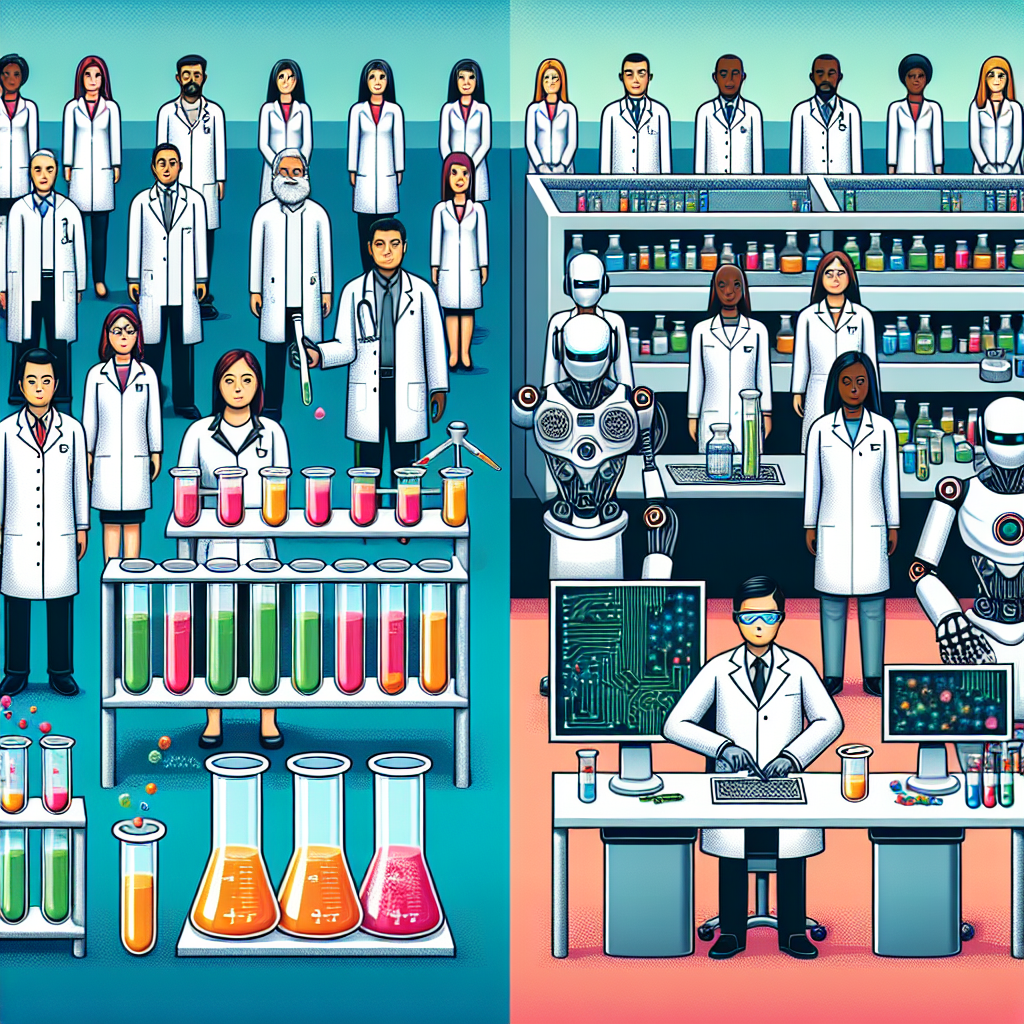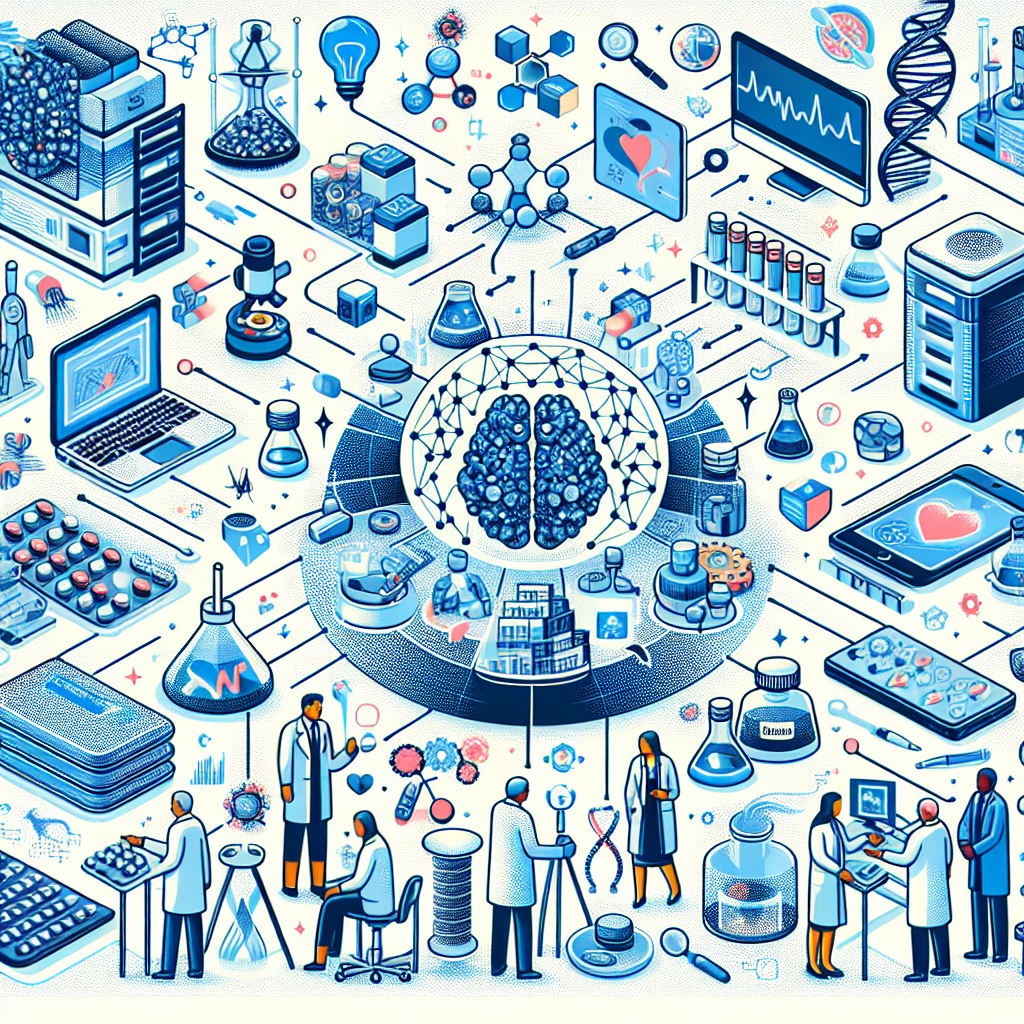How AI is Transforming the Pharma Industry

Discover how AI is revolutionizing the Pharma Industry! Learn about the latest advancements, the impact on drug discovery, patient care, and much more. Don’t miss out on this technological revolution. Click here to explore more.
Exploring the Impact of AI on Drug Discovery in the Pharma Industry
Artificial Intelligence (AI) is revolutionizing various sectors, and the pharmaceutical industry is no exception. The advent of AI in the pharma industry is transforming the way drugs are discovered, developed, and distributed. This article explores the profound impact of AI on drug discovery in the pharma industry.
Drug discovery is a complex, time-consuming, and expensive process. It involves identifying target diseases, researching potential compounds, conducting preclinical and clinical trials, and finally, obtaining regulatory approval. Traditionally, this process could take up to 15 years and cost billions of dollars. However, AI is poised to streamline this process significantly.
AI algorithms can analyze vast amounts of data faster and more accurately than humans. They can sift through millions of chemical structures, identify potential drug candidates, and predict their effectiveness and safety. This ability to process and analyze large datasets is particularly useful in the initial stages of drug discovery, where potential compounds are screened for their ability to interact with target diseases.
Machine learning, a subset of AI, is also playing a pivotal role in drug discovery. Machine learning algorithms can learn from data and improve their performance over time. They can identify patterns and trends that humans might miss, making them invaluable in predicting drug efficacy and side effects. For instance, machine learning models can analyze patient data to predict how different individuals might respond to a particular drug, enabling personalized medicine.
AI is also transforming the way clinical trials are conducted. AI algorithms can identify suitable candidates for clinical trials, monitor patient responses, and analyze trial results. This not only speeds up the trial process but also improves its accuracy and reliability. AI can also predict potential challenges in clinical trials, enabling researchers to address them proactively.
Moreover, AI is helping to democratize drug discovery. Traditionally, only large pharmaceutical companies with significant resources could undertake drug discovery. However, AI is leveling the playing field by making drug discovery more accessible and affordable. Startups and small companies can now leverage AI to discover and develop drugs, fostering innovation and competition in the industry.
Despite the significant benefits, the adoption of AI in drug discovery also presents challenges. These include data privacy concerns, the need for significant computational resources, and the lack of standardized regulations for AI in healthcare. However, with ongoing advancements in technology and regulatory frameworks, these challenges are likely to be addressed.
In conclusion, AI is transforming drug discovery in the pharma industry. It is making the process faster, more accurate, and more affordable. It is enabling personalized medicine and democratizing drug discovery. While challenges remain, the potential benefits of AI in drug discovery are immense. As AI continues to evolve and mature, its impact on the pharma industry is likely to grow, ushering in a new era of drug discovery and development.
The Role of Artificial Intelligence in Streamlining Clinical Trials

Artificial Intelligence (AI) is revolutionizing various sectors, and the pharmaceutical industry is no exception. One of the most significant areas where AI is making a substantial impact is in the streamlining of clinical trials. Clinical trials are a critical component of the drug development process, and they are notoriously complex, time-consuming, and expensive. However, with the advent of AI, the landscape of clinical trials is undergoing a significant transformation.
AI is playing a pivotal role in enhancing the efficiency and effectiveness of clinical trials. It is doing so by automating and optimizing various processes, thereby reducing the time and cost involved. For instance, AI can help in the identification and recruitment of suitable candidates for clinical trials. Traditionally, this process has been manual, labor-intensive, and prone to errors. However, AI can analyze vast amounts of data from various sources, such as electronic health records and genomic databases, to identify potential candidates quickly and accurately. This not only speeds up the recruitment process but also ensures that the selected candidates meet the specific criteria for the trial.
Moreover, AI can also help in monitoring the progress of clinical trials. It can analyze real-time data from various sources, such as wearable devices and electronic health records, to track the health status of the participants. This allows for timely detection of any adverse events or changes in the health status of the participants, enabling quick intervention. Furthermore, AI can also predict the outcomes of clinical trials based on the data collected. This can help in making informed decisions about the continuation or termination of the trials, thereby saving time and resources.
AI is also transforming the data analysis process in clinical trials. Traditionally, the analysis of clinical trial data has been a complex and time-consuming process. However, AI can analyze vast amounts of data quickly and accurately, providing valuable insights that can help in the interpretation of the trial results. This not only speeds up the data analysis process but also enhances the accuracy and reliability of the results.
In addition, AI can also help in the design of clinical trials. It can analyze data from previous trials and other sources to identify the most effective and efficient trial designs. This can help in reducing the trial duration and cost, while also increasing the chances of success.
However, despite the numerous benefits, the use of AI in clinical trials also poses some challenges. These include issues related to data privacy and security, as well as the need for regulatory oversight. Moreover, the use of AI requires a significant investment in terms of technology and expertise, which may not be feasible for all organizations.
In conclusion, AI is playing a transformative role in the streamlining of clinical trials in the pharmaceutical industry. It is enhancing the efficiency and effectiveness of various processes, from candidate recruitment to data analysis, thereby reducing the time and cost involved. However, to fully harness the potential of AI, it is essential to address the associated challenges and ensure that its use is ethical and compliant with regulatory standards. As we move forward, it is clear that AI will continue to play a pivotal role in shaping the future of clinical trials and the pharmaceutical industry at large.
How AI is Revolutionizing Patient Care in the Pharma Industry
Artificial Intelligence (AI) is rapidly transforming various sectors, and the pharmaceutical industry is no exception. The advent of AI in the pharma industry is revolutionizing patient care, making it more personalized, efficient, and effective. This transformation is not only beneficial for patients but also for healthcare providers and pharmaceutical companies.
AI’s role in patient care is multifaceted. One of the most significant ways AI is revolutionizing patient care is through predictive analytics. AI algorithms can analyze vast amounts of data to predict disease outbreaks, patient outcomes, and even potential adverse drug reactions. This predictive capability allows healthcare providers to intervene early, potentially preventing disease progression and improving patient outcomes. For instance, AI can analyze a patient’s medical history, genetic information, and lifestyle factors to predict their risk of developing certain diseases. This information can then be used to develop personalized prevention and treatment plans.
Moreover, AI is also transforming the way pharmaceutical companies develop drugs. Traditionally, drug development has been a lengthy and costly process. However, AI can streamline this process by identifying potential drug candidates more quickly and accurately. AI algorithms can analyze millions of compounds to identify those with the potential to treat specific diseases. This not only speeds up the drug discovery process but also reduces costs, making medications more accessible to patients.
AI is also playing a crucial role in improving medication adherence. Non-adherence to medication is a significant issue in healthcare, leading to poor health outcomes and increased healthcare costs. AI can help address this issue by sending reminders to patients to take their medication, tracking medication intake, and even predicting which patients are at risk of non-adherence. This can help healthcare providers intervene early and ensure patients are taking their medication as prescribed.
Furthermore, AI is enhancing patient engagement and satisfaction. AI-powered chatbots, for instance, can provide patients with instant responses to their queries, schedule appointments, and even provide health advice. This not only improves patient engagement but also frees up healthcare providers’ time, allowing them to focus on more complex tasks.
In addition, AI is also improving clinical trials, a critical aspect of the pharma industry. AI can help identify suitable candidates for clinical trials more quickly and accurately, reducing the time and cost of these trials. AI can also monitor trial participants in real-time, allowing for immediate intervention if adverse reactions occur.
Despite these benefits, the use of AI in patient care also raises several ethical and privacy concerns. For instance, the use of AI requires the collection and analysis of vast amounts of personal health data, raising concerns about data security and privacy. Moreover, the use of AI in healthcare decision-making raises questions about accountability and transparency.
In conclusion, AI is revolutionizing patient care in the pharma industry, making it more personalized, efficient, and effective. However, it is crucial to address the ethical and privacy concerns associated with AI to ensure its benefits are fully realized. As AI continues to evolve, it is set to play an increasingly important role in the pharma industry, transforming patient care and improving health outcomes.